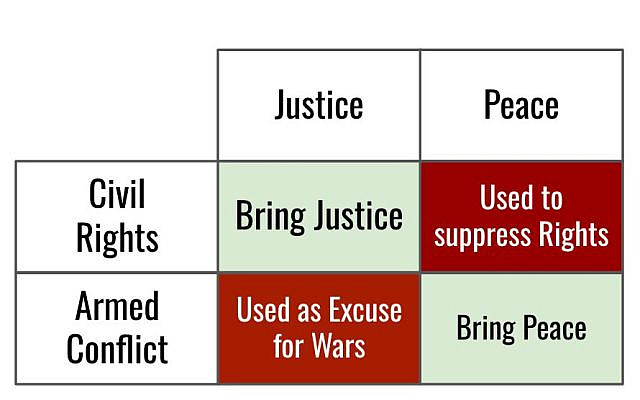Seduced by justice?
I recently spoke with an Israeli friend living in the United States who has been taking the admirable initiative of going to anti-Israeli demonstrations and starting dialogues with the people who stand against the Zionist state. I do not share my friend’s courage, but we do share a worldview that is common in Israel and that is self-critical of Israel — Israel indeed has a self-critical culture that many people partake in. This is a worldview that we also share with many — if not most — of the victims of October 7, some of whom were peace activists and many (likely most) of whom were left-leaning.
My friend put it well when he said that he is pro-Israeli but is somewhat anti-Zionist. If we could go back on a time machine and speak to our Zionist grandparents, we would likely give them the unsolicited advice to try to immigrate to America instead. Also, it should be noted, given the fact that I am Canadian and that we both live in North America, that Palestine is in fact free of our own personal presence on the land. But we love Israel, and more importantly, we know that Israel is not a negotiable fact: it is a place where my nephew and nieces wake up every day and live their innocent lives. It is the place where my parents were born and have been living their innocent lives.
When making conversation with anti-Israeli protesters, my friend’s genuine strategy is to tell them that he agrees with much of the criticism of Israeli politicians. He then asks them an essential question: what is their vision for peace and how can peace be achieved?
The overwhelming response he gets from the educated people with whom he converses is a rejection of the concept of peace in favor of an uncompromising call for justice. Implicitly, he is accused of “peace washing” — as if the mere invocation of the desire for peace is an attempt to deny the injustice done to the Palestinians and a desire to perpetuate a state of injustice. Anti-Israel demonstrators take pains to explain that social-justice activism is not about peace but about fighting injustice — a struggle that should not be stifled by the word “peace.” This stance is then emboldened by a barrage of facts designed to prove grave injustice against the Palestinians.
In response, my friend says that he could bring his own facts — but the deeper point is to understand how the concept of justice is being manipulated. He has prepared the table shown above that explains that in the struggle for civil rights, invocations of justice indeed serve the interests of justice, while invocations of peace may be used to suppress rights and perpetuate an unjust status quo. However, in cases of armed conflict, rhetoric of justice may be used as excuse for war.
When sincerely practiced in matters over which one truly has agency (charity starts at home)—justice is rich in meaning. But as a word, justice can also be vague and highly subject to manipulative mobilization — justice as a mask and a smoke screen concealing disregard for human lives. For example, in a February 24, 1941 speech, Hitler self-identified as “a man who hopes that, at least after his death, common justice will concede that the struggle of his whole life served a single great ideal.” He reassured his followers that their efforts were in the service of a just cause: “We know that the untold sacrifices we have made cannot have been in vain, because we believe in supreme justice.”
Another outcome that my friend has experienced among those who self-identify as seeking justice for Palestine is worth noting: when he starts engaging in peaceful dialogue with protesters, typically one of the protest organizers promptly approaches him to assertively break up the conversation.
This experience from the field adds to my feeling that some well-meaning people currently engaged in anti-Israeli activism might possibly end up experiencing remorse down the line. One day, they might wake up to realize that their love for the concept of justice has been manipulated, controlled and exploited. I am saying this based partly on personal experience—as someone who myself showed vulnerability to being manipulated by rhetoric of justice in the past and have suffered as a result.
There are essentially two ways to lead decent people down a misguided path: one is to bully them; the other is to seduce them.
Anti-Israel activists are metaphorically selling a worldview that presents itself as informed by irrefutable facts but that is in fact often mythological and imaginative in nature—in some ways an aesthetic construct. People seduced into that worldview are encouraged to imagine Israel, a country that they often know very little about, as a place of privilege and evil—not as the home of millions of ordinary humans with daily worries and struggles—and Gaza as a place of misery that is unrealistically devoid of moral responsibility or opportunity.
The following video provides insight into how the concept of Palestinian victimhood has been perpetuated:
https://www.youtube.com/watch?v=M06S7R6vfVs&t=23s
But anti-Israel warriors do not seem to be interested in real justice informed by facts and by a desire for peace. Rather, their rhetoric of justice seems to be an instrument of power. In this way, well-meaning people are seduced into a controlling worldview in which their attraction to justice is used to give power to war lords and agitators—some likely paid and others likely enthusiastic volunteers.
Some people who have been seduced by the concept of justice might experience remorse one day when they wake up to realize how the view of justice that they have been sold requires imposing massive, sadistic, Holocaustian injustice on the Jews living in Israel. This is a kind of injustice that they, as self-identifying colonial settlers in North America, would never accept to be brought down upon themselves. Indeed, what lies at the heart of relationships between Indigenous and non-Indigenous people in North America is the concept of reconciliation—and reconciliation by construction requires a commitment to peace. Israel haters, in contrast, tend to reject reconciliation. Their vision of justice often implicitly disregards the moral agency an accountability of those labelled as victims and, on behalf of the victims, thirsts for blood, vengeance, murder and destruction.
No form of social justice should require murder, rape, kidnapping or destruction. Justice is too loose a term, and those who use it carelessly today because their thought leaders told them to might one day have to look at themselves in the mirror and see themselves for what they have allowed themselves to become—people who partake in the pleasures of Jew hate.
Some of them might also rightly come to see themselves as people who have been controlled and manipulated—a conquest of the war lords who demonize Israel from the safe and comfortable distance of North America.
So far, anti-Israel seducers have relied heavily on uncritical acceptance of narratives that depict unimaginable suffering in Gaza and that blame that suffering on a mythologized and demonized “Zionist entity.” However, the recent attack on Israel by Iran helps to draw attention to the fact that there is much more at stake than concern for the suffering of the Palestinians—that the concept of Palestinian suffering is used as a toy in the hands of war mongers whose agenda is domination and destruction.
As I conclude this, it is not only the boundaries of Israel that I am concerned about. It is also the personal boundaries and emotional safety of the people seduced by Israel hate.
If your anti-Israel protest leader or thought leader is trying to discourage you from having a conversation with my knowledgeable and well-meaning Israeli friend, could it be that you have allowed that influencer to conquer something that should belong to you alone—your liberty?




